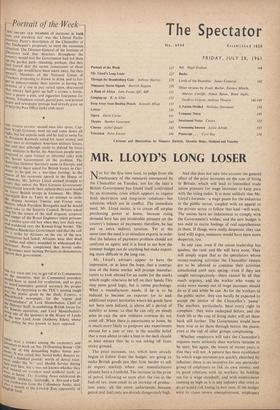MR. LLOYD'S LONG LOSER
Mr. Lloyd's advisers appear to have the impression, or at least the hope, that a contrac- tion of the home market will prompt manufac- turers to look abroad for an outlet for the stocks which might otherwise be left on their hands. This may seem good logic, but is rotten psychology. What a manufacturer needs, if he is to be induced to become an exporter (or to seek additional export territories where his goods have not been seen before), is above all a period of stability at home, so that he can rely on steady sales in case the new ventures overseas do not come off. When there is uncertainty at home, he is much more likely to postpone any experiments abroad for a year or two, in the sensible belief that a man about to take a leap in the dark should at least ensure that he is not taking off from sticky ground.
The price increases, too, which have already begun to follow from the budget, are going to make British goods just that little harder to sell in export markets where our manufacturers already have a foothold. The increase in the price of petrol, following so soon after the rise in the fuel-oil tax, must result in an increase of produc- tion costs; all the more unfortunate because petrol and fuel costs are already dangerously high. And this does not take into account the general effect of the price increases on the cost of living in Britain, which will lead to intensified trade union pressure for wage increases to keep pace with the rising index. It is most unlikely that Mr. Lloyd's formula—a wage pause for the industries in the public sector, coupled with an appeal to the private sector to follow that lead—will work. The unions have no inducement to comply with the Government's wishes; and the new budget is too mild to excite feelings of real apprehension in them. If things were really desperate, they can (and will) argue, measures would have been more desperate, too.
In any case, even if the union leadership has qualms, the rank and file will have none. They will simply argue that as the speculators whose money-making activities the Chancellor resents are to be allowed to continue their activities unmolested until next spring—even if they are caught retrospectively—there cannot be all that much urgency, and the worker who wants to make more money out of wage increases should do so if and while he can. As for the workers in the public sector, they can hardly be expected to accept the justice of the Chancellor's `pause.' The teachers, particularly, have every right to complain : they were underpaid before, and the fresh lift to the cost of living index will set them back still further. The Government would have been wise to let them through before the pause, even at the risk of other groups complaining.
Whether employers will take the Chancellor's requests more seriously than workers remains to be seen; but again, the lesson of recent years is that they will not. A pattern has been established by which wage increases are quickly absorbed by inflation; there is no incentive for any particular group of employers to 'risk its own money, and its good relations with its workers, by holding out for a wage standstill; and with employment 'running as high as it is any industry that tried to do so would risk losing its best men. If the budget were to cause severe unemployment, employers might think again; but this can hardly have been in the Chancellor's calculations.
There can be only one justification for Tues- day's measures: that they should turn out to represent simply a short-term project to defend sterling, with the long-term plan to follow. And this is possible; for if the Prime Minister makes it clear next week that the Government intends to bring Britain into the Common Market, this in itself would be sufficient to put the future of the country's economy on to a different footing. Industry then will have something to aim at: manufacturers will know what they have to com- pete with; and the restrictive practices which the Chancellor deplores will be disrupted by the knowledge that the shelter of protection now given to monopolies and trade rings will be knocked down. The final verdict, therefore, on this summer budget must be postponed until after next week's debate.



































 Previous page
Previous page